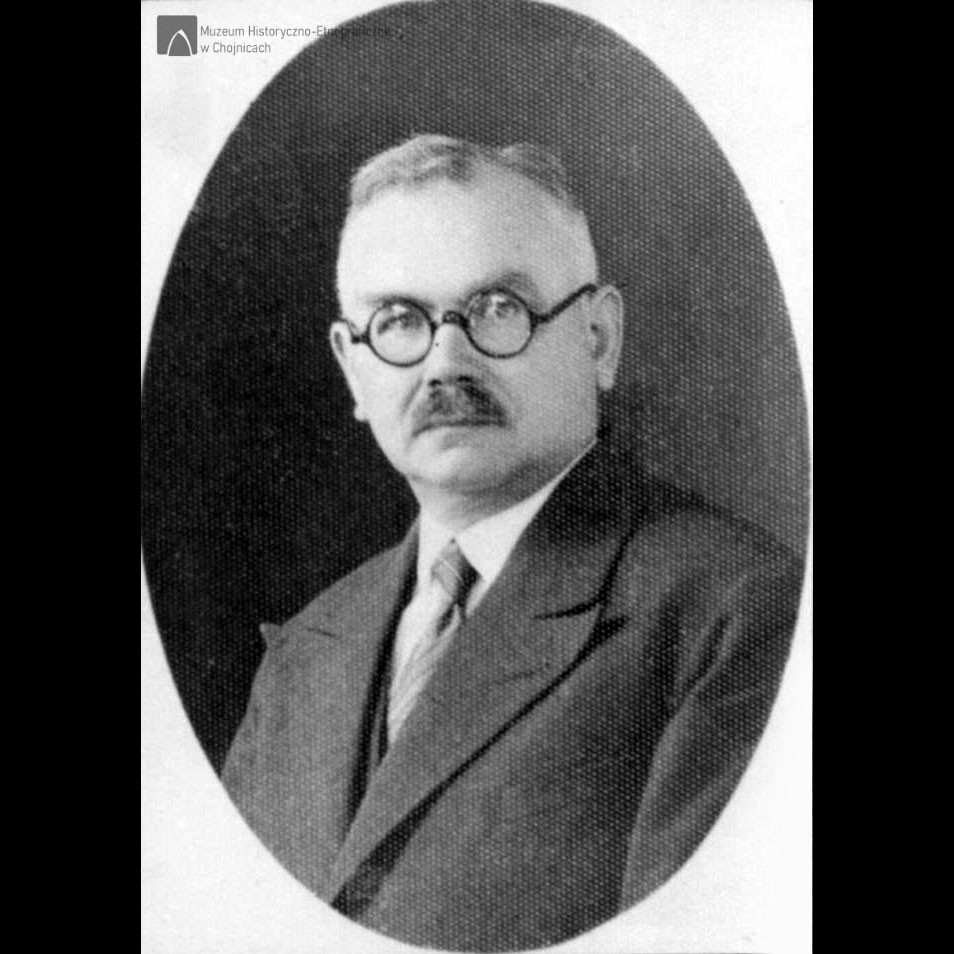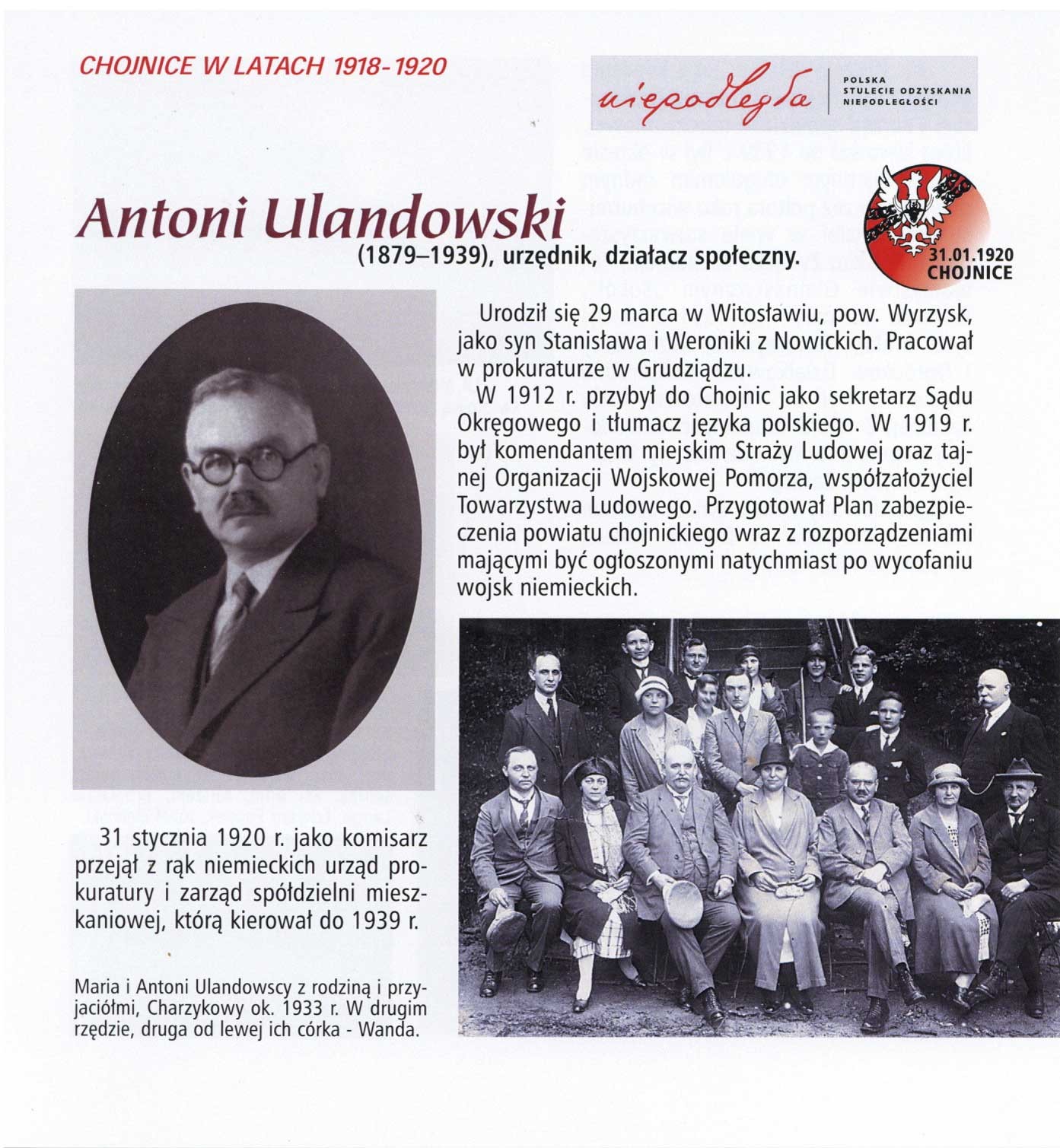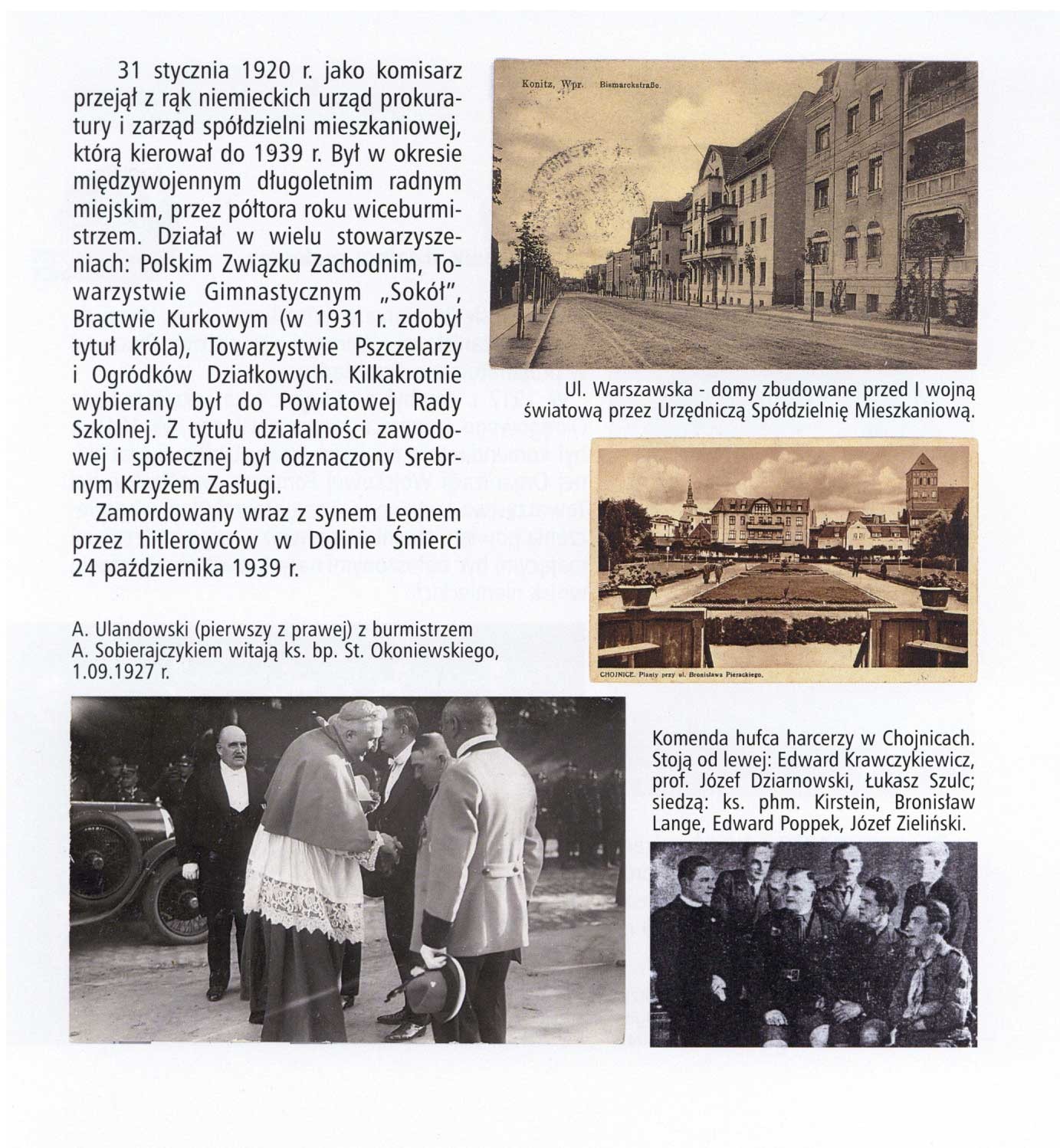
Antoni Ulandowski (1879-1939), local government activist, civil servant, leader of social organisations.
Born on 29 March 1879 in Witosław, Wyrzysk District, as the son of Stanisław and Weronika née Nowicka. After finishing gymnasium in Gniezno, he worked as a clerk in the prosecutor's office in Grudziądz. His fate was linked with Chojnice in 1912, when he was transferred to the post of secretary of the prosecutor's office and translator. He then became a member of the hitherto small circle of Polish intelligentsia in the town. During the First World War he served in the German army, taking part in frontline battles. After the end of hostilities, he returned to Chojnice and joined the current of activities for the restoration of Pomerania to a reborn Poland. He was a commander of the Secret Military Organisation (TOW) for the Chojnice district, which made preparations for the fight against the partitioner in Pomerania. Antoni Ulandowski co-organised the first Polish organisations emerging in Chojnice in 1919: People's Society and Gymnastic Society ,,Sokol’.
The district People's Council (PRL) on 14 August 1919 appointed Ulandowski as district commander of the People's Guard, whose task was to keep the peace in the various towns and cities during the seizure of power from the Germans. In the autumn, the PRL took over the plan of action developed by Ulandowski for security in the town and district during the departure of the German army. 31 January 1920. Antoni Ulandowski reported to Lt. Col. Stanisław Wrzaliński, commander of the 59th Wielkopolska Infantry Regiment taking over the city for the Republic, on the activities of the People's Guard and the state of security. On the same day, on behalf of the liquidation commission of the Polish People's Republic, he took over the commissioner's office of the public prosecutor. In independent Poland, he worked as chief secretary in the district prosecutor's office, contributing to the process of polonisation of the offices. He retired in 1933.
In April 1920, he became a member of the commissar city council. In November 1921, the first democratic local elections were held. Antoni Ulandowski became a member of the Magistrate and took up the position of a part-time deputy mayor from 1 January 1922. He resigned from this position after a year and a half in office. In the following term 1926 - 1929, he was one of five Christian Democrat councillors in the City Council. In the following years 1929 - 1933 he represented the Christian Democrats. He was then once again a member of the Magistrat, the collegial municipal board. Ulandowski made many efforts to improve the living conditions of the inhabitants.
From 31 January 1920 Antoni Ulandowski exercised state management over the assets of the housing co-operative, then called the Official Housing Association. From 4 July 1922. The Supervisory Board entrusted Ulandowski with the function of chairman of the board. The name was changed to the Official Housing Cooperative. The co-operative in Chojnice was one of the oldest in Pomerania, and within ten years had built 17 houses with 102 flats. Antoni Ulandowski enjoyed an impeccable reputation among the Chojnice society while holding the position of chairman - president, which he held until the outbreak of the Second World War.
Antoni Ulandowski was elected several times to the District School Council, an advisory body to the school inspector, in which he represented the Chojnice community. Politically, he was associated with the Christian Democracy, which after the May Coup took a position in opposition to the Sanation camp.
Another field of Antoni Ulandowski's social activity was the Society of Beekeepers and Allotment Gardeners, of which he was president for many years. It was the effort of this organisation, with the participation of Mayor Sobierajczyk, to establish in 1929 an employee garden on the right side of Szosa Bytowska, the oldest in the city and one of the few in Pomerania.
Promoting physical culture was also an important part of Ulandowski's social activities. He belonged to the ‘Sokol’ organisation, promoting the spirit of patriotism among its members. He was also active in the Union for the Defence of the Western Borderlands, and from 1934 in the Polish Western Union (PZZ), which expanded its activities after the intensification of Germany's aggressive, anti-Polish fascist policy. He was also a member of the Kurkowy Bractwo Strzeleckiego (Rifleman's Fraternity), an organisation with a cultural character, nurturing old bourgeois customs. In 1938, the Chojnice Shooting Fraternity celebrated its 550th anniversary. Antoni Ulandowski won the title of king of the chancery in the annual shooting in 1931.
Antoni Ulandowski was married to Maria Łasińska from Łobżenica, who accompanied her husband in social activities. The Ulandowskis had two children: a daughter Wanda (1908-1976) and a son Leon (1914-1939).
In the first period of the Nazi occupation, Antoni Ulandowski fell victim to the extermination of the intelligentsia, together with his 25-year-old son Leon, a student at the Kraków Academy of Commerce. They were arrested by the Gestapo on 23 October 1939 and taken to the suburban Death Valley the following day and shot.
patriotism. He was awarded the Silver Cross of Merit for his self-sacrificing work for Chojnice society. A commemorative plaque was also unveiled on the house at 23 Warszawska Street, which he lived in with his family.
More information about Antoni Ulandowski can be obtained from the following publications: Zbigniew Stromski, Pamięci godni. Chojnicki słownik biograficzny 1275 - 1980, Chojnice 1986 and Ludzie Pomorza lat 1920 - 1939. Szkice biograficzne, Gdańskie Towarzystwo Naukowe, seria ‘Pomorze Gdańskie’, vol. 11, Gdańsk 1977.

